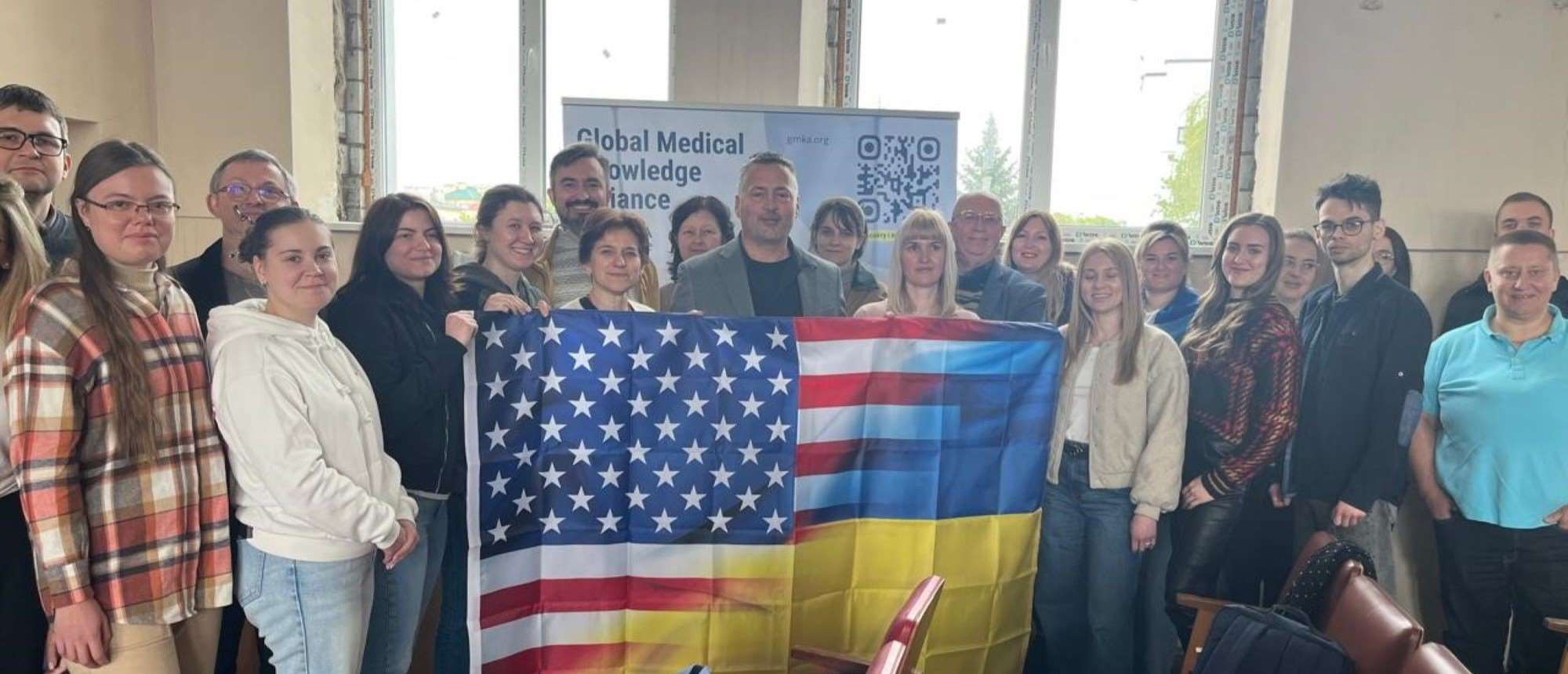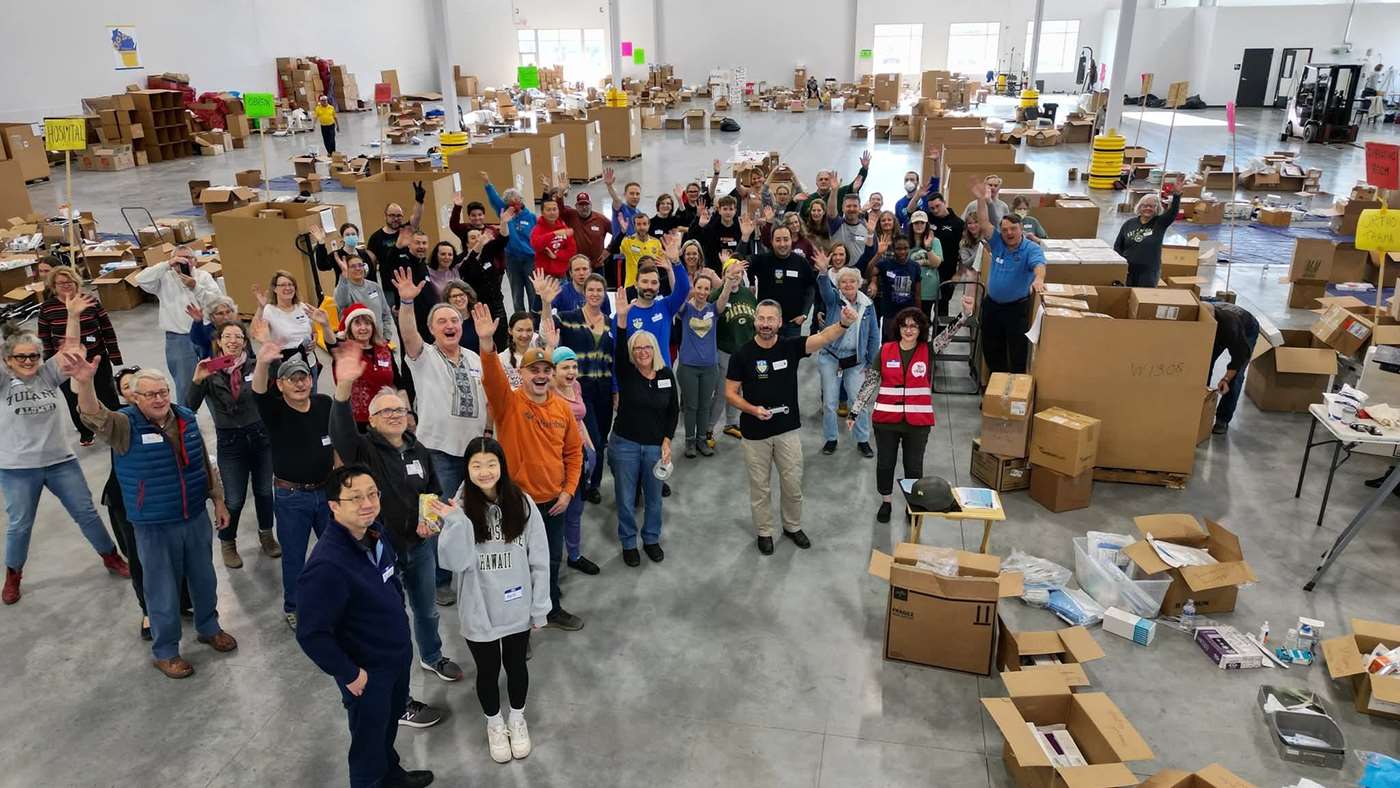MCW Professor Helps Lead Efforts to Provide Medical Aid to Ukraine

If you’d asked Douglas Davis, MD, PhD, assistant professor of radiology at the Medical College of Wisconsin (MCW), three years ago where he’d be now, he would probably never had guessed that he had left his practice as a neuroradiologist and radiologist in Madison to work with top levels of government across the globe to aid the war-torn country of Ukraine.
“It's clearly for me the most meaningful and impactful work I feel like I've ever done in my career,” says Dr. Davis, who has helped lead an effort to bring much needed medical aid supplies to Ukraine and plays a key leadership role in several other aid organizations.
Dr. Davis is married to a native of Ukraine, Nataliya Uboha, MD, PhD, an associate professor at the University of Wisconsin-Madison’s Carbone Cancer Center. He says he adopted the Eastern European country of more than 37 million residents after meeting his wife and her family and visiting the country more than 25 years ago.
He and his wife had been supporting smaller projects in Ukraine for years, but the urgency to help became more critical after Russia invaded the country in 2022.
When the war started, Dr. Davis reached out to colleagues and contacts at MCW, the Rotary Clubs of Madison and Milwaukee, Wisconsin Ukrainians, Inc., Help Heroes of Ukraine, and the Ukrainian Medical Association of North America's Chicago chapter, among others, to collect hundreds of tons of medical supplies, which they stored in a local warehouse until it was shipped to Ukraine.
The supplies included sutures, ventilators, operating room tables, ultrasound machines, first-aid kits, and just about any other device you would find in a hospital, says Dr. Davis. Organizations donated flights and cargo shipments to move the supplies to Ukraine.
“It’s something I always wanted to do but never had the means to do in a large-scale way before,” Dr. Davis says.

Volunteers at a warehouse in Milwaukee where they stored medical supplies to send to Ukraine.
Providing Critical Care Training, Connections with NGOs
The group’s work to provide medical aid has now grown more sophisticated.
“When we were starting, we were just trying to send aid and support to Ukraine, but we had no ability to control where it was going,” Dr. Davis says. “Now, if I want to get a specific piece of equipment to a specific doctor in a specific location, we can do that.”
Dr. Davis sits on the board of five different non-governmental organizations (NGOs) that provide aid to Ukraine. He says each play a critical role in supporting the country and have strong connections with the Ukrainian government, which have allowed them to shift focus to providing more than just supplies.
“We now run combat casualty trauma training, surgery training, training on clinic care and ultrasound use – really all manner of support of the healthcare systems,” he says.
 Dr. Davis also helped organize and host two medical conferences in Ukraine, one in Kiev that focused on critical care topics and another that focused on women in leadership.
Dr. Davis also helped organize and host two medical conferences in Ukraine, one in Kiev that focused on critical care topics and another that focused on women in leadership.
(Pictured right: Dr. Davis speaking in Kyiv at a meeting for Ukraine's Committee on National Health, Medical Care and Health Insurance.)
Those conferences included participation from colleagues across Ukraine and the United States, including some from Harvard, Yale and Stanford universities, and led to the formation of the Ukrainian Alliance for Medical Exchange and Development.
“We've been trying to do a lot of work to build more bridges between our network of not only NGOs that are interested in helping Ukraine, but also major academic institutions that have a global health interest to create a bi-directional exchange,” Dr. Davis says.
Supporting Ukraine at Home and Abroad
With regular travel to Ukraine for his aid efforts, Dr. Davis aims to help build systems and frameworks that support Ukraine's overall countrywide health care system.
“We've been really working on trying to create standardized systems of training and standardized training,” Dr. Davis says.
Key challenges in Ukraine include the high levels of trauma and acute care needed, differences in quality of medical care based on resources and training, and challenges related to mental health such as high levels of PTSD among soldiers.
“We’re trying to use the entire Ukrainian government system, our NGO networks, and our academic institutions here in the United States to basically help them create a framework so that the civil society doesn't collapse because of all these public health crises,” Dr. Davis says.
Dr. Davis says being a professor at MCW has helped ground him as he continues his efforts to support Ukraine. His position allows him to continue teaching radiology while also having time to work on global health and support his adopted homeland.
“It’s been an amazing journey and evolution over the course of the past three years,” he says.



